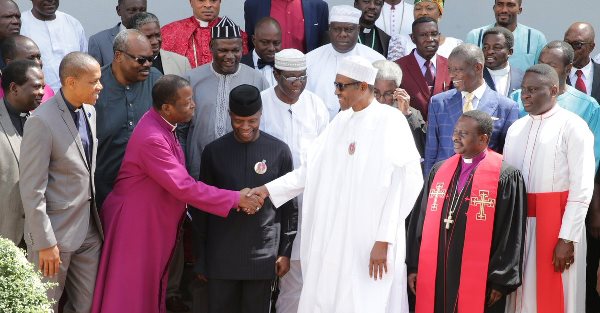National Democratic Front (NDF), which handed this warning to the religious organsiatons, said it was appalled by activities of the group in the country as they continue to rapidly evolve into political parties.
According to Dr Bolaji Abdulkadir, Secretary General, who gave the warning on behalf of NDF on Monday, the trend is a dangerous slide into chaos, one that must be avoided at any cost.
Speaking at a press conference, Abdulkadir claimed that CAN, NSCIA and other groups that have become cheerleaders for political parties in their own interest.
The group also frowned at the failure of both religious bodies to contribute meaningfully to addressing the security challenge posed by terrorism, separatist agitations and militancy in the country.
His statement reads below.
In the period leading to the General Elections the Christian Association of Nigeria (CAN) became fully partisan. It started by leaning towards the endorsement of the Peoples Democratic Party (PDP’s) presidential candidate, Alhaji Atiku Abubakar. To drive home the point, many Christian clergy were to later desecrate their altars by going full blown partisan and presented their campaign for PDP as Sunday sermons.
If CAN’s indiscretion is cringe worthy, the decision of Nigerian Supreme Council for Islamic Affairs (NSCIA) to join its counterpart in the mud is beyond describable. NSCIA castigated CAN in a way that is capable of triggering a tit-for-tat, which could in the long run escalate into physical face-offs. It is a clear case of two wrongs not making a right.
Ironically, in our view, CAN, NSCIA and other groups that have become cheerleaders for political parties are not even doing so in order for reputable persons to emerge.
They are rather shopping for those that would be pliable thieves that would loot the treasury and remit part of the proceeds of crime to their members. What we find baffling about this dubious mind-set is that it presents God as complicit in money laundry in addition to perpetually keeping the country back from pursuing development agenda. Instead of preaching messages that liberate the minds of their followers, members of these religious organizations continue to promote the myth that poverty is a spiritual condition instead of tracing it to years of bad governance and neglect.
With this kind of attitude, there is no doubt that the Church and the Mosques have refused to take their eyes away from corruption. Their approach to the scourge has made it fashionable in government circle where people steal without mercy and only to pay same back to their paymasters. They have even made it to spread into the private sector whose employ do not want to be left behind in showing off affluence in places of worship so they become desperate to keep up with their counterparts in government. No wonder businesses are collapsing while religious leaders acquire new batches of impoverished people to brainwash.
What we further find confounding is that neither CAN nor NSCIA has productively intervenea in areas where they are needed. If we take the scourge of kidnap for ransom for instance, perpetrators are often adherents of Christianity or Islam yet these umbrella religious organizations have not been proactive enough to leverage on their spiritual influence to address the problem and preach against it. They have also failed to contribute meaningfully to addressing the security challenge posed by terrorism, separatist agitations and militancy as it appear they have elected to ignore these issues because contributing to their eradication will not translate into financial gains for them.
The most glaring area of failure on the part of both organizations is their open endorsement of corruption and theft of public funds. Politicians in Nigeria identify either as Christians or Moslems and it is highly unfashionable for those seeking elective offices to identify as skeptics, agnostics or atheists.
But these same politicians get into office to steal money and the clergymen that make up CAN and NSCIA are not known to have ever rejected the tithes, offerings, donations and buildings presented to places of worship by these people. It is not even usual for leaders of these organizations to have ever upbraided their faithful found to have stolen money – they instead organize prayer sessions to deliver them from prosecution by the Economic and Financial Crimes Commission (EFCC).
As they continue making less than responsible comments and interventions in the politics, we wonder if CAN and NSCIA are aware that they are increasingly appearing like the religious wings of the PDP and APC. This is clearly dangerous to democracy more so when APC had been maligned in the past as a party that has an Islamization agenda and the PDP is increasingly appearing like a party favoured in Christian dominated areas. If the leaders of CAN and NSCIA continue to indulge this misconception until it becomes a reality then the blood of those that would die from potential crises from this shall be on their hands.
It is our earnest expectation that both religious organizations will retrace their steps and return to the founding ideals that bought them into existence. They can continue to contribute to the polity by leveraging on their position to discourage the faithful of the religions they represent from engaging in corruption, extremism, terrorism and other acts that are inimical to the wellbeing of Nigeria. They should stay off partisan politics, focus on governance and involve themselves more in community development and service to humanity.
Once they return to doing this, CAN and NSCIA would again find themselves as reputable organizations whose words would be taking as final when they weigh in on national issues.
